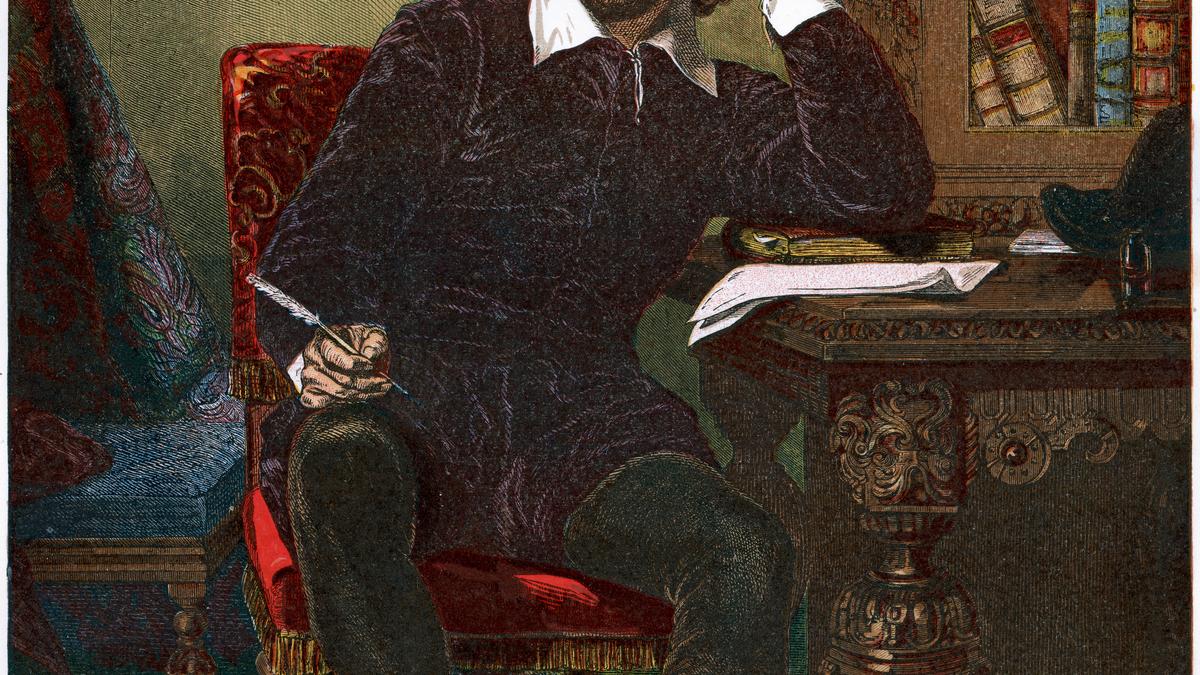
A vintage colour lithograph from 1853 of William Shakespeare.
| Photo Credit: Getty Images
April 23 marked the 461st birth anniversary of the Bard of Stratford-on-Avon, William Shakespeare, who was described by his scholarly contemporary Ben Jonson as the “Soul of the Age”. Shakespeare was born in 1564, a year which was significant in the sense that it announced the death of Michelangelo and Calvin, the former representing Renaissance in the field of the arts and the latter Reformation in the field of religion.
Shakespeare’s works summed up the essence of both. He died in the same year as Cervantes, the author of Don Quixote, which is the first of the modern novels that wrote an epitaph for the Middle Ages. It looks like writing plays and staging them had no literary credibility that poets used to enjoy during the period in which Shakespeare lived. It is said that Shakespeare had to write sonnets to prove his literary worth. This is the reason his plays had to be published posthumously. His first folio entered print only in 1623, seven years after his death.
Ben Jonson, though he was held in high esteem as a literary scholar (“If learned Jonson sock be on, or sweetest Shakespeare, Fancy’s child” — John Milton), was ridiculed by the academics when he published his plays during his lifetime. Though Shakespeare’s infinite variety of characterisation is inexhaustible, my favourite is his portrayal of the historical personalities. When one writes prose, fiction or drama based on historical figures, history is mostly a grand setting, a background against which the characters love, hate, suffer, and experience their personal dramas. But it appears Shakespeare looked at history in a totally different way. It is not a background or setting, but it is, by itself, the protagonist of a tragedy.
History has no meaning, it constantly repeats itself in a cruel cycle as if it is an elemental force, like hail, storm, hurricane, birth and death. One can find Shakespeare repeating it over and again in his tragedies, King Lear, Macbeth, Hamlet, Richard II, and Richard III. Most of Shakespeare’s historical plays are about power and politics. During the reign of the Plantagenet kings in England in the 14th and 15th centuries, history was a metaphorical staircase sketching the climb and fall of kings and their progenies. They were either dethroned or murdered or both, almost reading like Mughal history after Jehangir.
Magical plots
Among the historical plays of Shakespeare, the most fascinating is Richard III. It is very difficult to analyse this complicated character. He has a compelling presence, in spite of his uncouth physical bearing. He murders everyone that proves to be a hurdle for him to ascend the throne, but yet, while reading or watching every scene, one cannot but wait for him to arrive. So absorbingly interesting is his character. This is, precisely, what is known as Shakespearian magic.
One illustration. It is just before early dawn, a time when royal or political conspiracies are hatched. All the barons and political bigwigs have assembled at the Tower, waiting for the most important man, Lord Protector, the Duke of Gloucester (later, King Richard III) to arrive. The ruling king is dead and who is to ascend the throne? The decision has to be made by Richard. The dead king has two minor sons. Everyone in the assembly knows Richard’s intentions. Richard knows that he has to dispose of a few friends and foes and also the minor heirs to the throne before he sits on it. And he cannot do it openly. The atmosphere is tense. The lords talk among themselves that the Lord Protector may be requested to reveal his decision. Suddenly there is thundering silence as Richard enters in measured steps in deep contemplation, as if in meditation. Everyone looks at him in awe and anticipation.
Richard turns towards the Bishop of Ely. The Bishop trembles. Richard says: “My Lord of Ely, when I was last in Holborn I saw good strawberries in your garden there; I do beseech you send for some of them.” Saying this, he leaves the place. All of them look at each other in confusion and anxiety. What does the tyrant want? Strawberries or throne? This is vintage Shakespeare. This could be very well be from Beckett’s or Ionesco’s play with a similar dialogue. Later, he accuses most of them including the Bishop Ely of conspiracy and sends them to the Tower. That is another story.
Published – April 27, 2025 04:37 am IST
